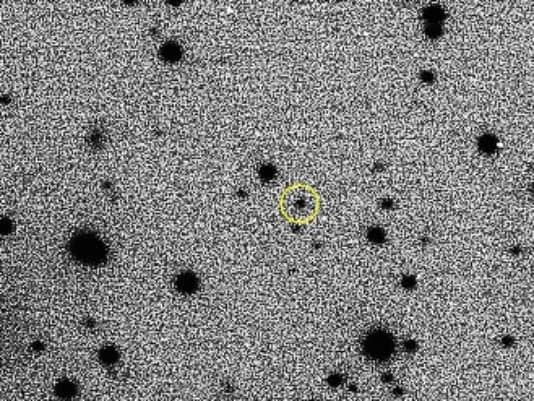
Hey bub, you’re going the wrong way.
The solar system’s first known “resident” that came from interstellar space — an asteroid orbiting backward around Jupiter — has been discovered, scientists announced Monday.
“How the asteroid came to move in this way while sharing Jupiter’s orbit has until now been a mystery,” said Fathi Namouni, lead author of the new study and a scientist at the University of Cote d’Azur in Nice, France.
The planets and most other objects in our solar system travel around the sun in the same direction. This asteroid is different — moving in the opposite direction in “retrograde” orbit.
The asteroid has the inelegant name of 2015 BZ509, indicating the year of its discovery.
Astronomers base their finding on extensive computer simulations that show the object has always orbited in reverse around the sun.
“If 2015 BZ509 were a native of our system, it should have had the same original direction as all of the other planets and asteroids, inherited from the cloud of gas and dust that formed them,” Namouni said.
The asteroid, about 2 miles across, arrived in our solar system shortly after it formed 4.5 billion years ago.
If it’s not native to our solar system, then where did it come from?
“Asteroid immigration from other star systems occurs because the sun initially formed in a tightly packed star cluster, where every star had its own system of planets and asteroids,” said Helena Morais, a study co-author from Sao Paulo State University in Brazil.
“The close proximity of the stars, aided by the gravitational forces of the planets, help these systems attract, remove and capture asteroids from one another,” she said.
The study comes several months after the discovery of another interstellar asteroid named Oumuamua, which briefly zoomed through the solar system last fall.
Other experts questioned whether the new asteroid came from outside our solar system.
“It’s feasible what they’re saying, but there are other possibilities,” Elisa Quintana, an astrophysicist at NASA’s Goddard Space Flight Center told The Washington Post. Quintana, who was not involved in the study, said, “We live in such a dynamical universe, it’s hard to rule out just pure chaos and collisions.”
The study’s authors said the discovery of the first permanent asteroid from outside the solar system opens questions about how planets form, the evolution of the solar system and and possibly the origin of life itself.
Morais said looking for strange orbits may help scientists identify other alien asteroids hiding in the solar system, the Canadian Broadcasting Corp. reported. “We believe others are there at the moment. The question is to figure out which ones.”
The study was published in Monthly Notices of the Royal Astronomical Society: Letters.

